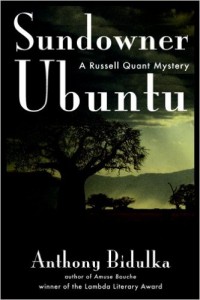 Sundowner Ubuntu
Sundowner Ubuntu
by Anthony Bidulka
Insomniac Press. 286 pages, $15.95
ANTHONY BIDULKA’S Russell Quant novels offer an engaging variation upon the pattern established by Hansen and extended by writers like Michael Nava in the Henry Rios series and Sue Grafton in the alphabet series. Far from being marginalized by his society, Russell lives at the center of a strong circle of friends, both gay and straight, who meet regularly for drinks, celebrate each other’s birthdays, and support each other in times of trial.
One of the most engaging features of the series is following the shifting balance of their relationships as personal crises arise among his friends to which Russell must attend while working on a case. His office is in a small complex where he shares coffee, gossip, and a receptionist with three other professionals. Thus, although he must endure his share of beatings and take part in the periodic car chase, Russell is more likely to try to negotiate his way out of a tight situation with a quip than with his fists. While his sexuality is the defining element of Russell’s identity, it is surprising how seldom it becomes an issue for those with whom he comes in contact.
The action of Sundowner Ubuntu, the fifth in the Russell Quant series, is set in motion when Russell is hired by a middle-aged woman named Clara Ridge to locate her, son whose juvenile delinquency caused her husband to disown the boy when he was only sixteen. The recent death of her flint-hearted husband has freed her to search for Matthew, whom she hasn’t seen or heard from in twenty years. Russell’s search eventually takes him to a slum in South Africa and a game preserve in Botswana, where Matthew—who mysteriously changed his name and dedicated himself to teaching after serving a period of juvenile incarceration—volunteers at an impoverished school and moonlights as a translator. Russell’s search is complicated when he falls in with an American photographer in Johannesburg who, unbeknownst to her, is being trailed by a detective hired by her jealous husband. Much of the delight of the novel stems from Bidulka’s juxtaposition of the “local color” of the Canadian prairies (Russell’s home is Saskatchewan) with the steamy, exotic grasslands of South Africa.
The moral seriousness of the novel is suggested by the title. “Ubuntu” is an African word meaning humanity that comes from community: “I am what I am because of who we all are.” Russell discovers that South African tribal culture is founded upon a sense that “no bad deed against anyone is perpetrated without consequence, otherwise all bad deeds against humanity will flourish.” As the mystery unfolds, Russell figures out that a series of vicious attacks on the witnesses whom he contacts is the residual result of Matthew’s adolescent act of violence. Unable to forgive the attack that tragically altered his life, Matthew’s victim pursues his vendetta in adulthood. But, Bidulka implies, Matthew’s dedication as a teacher and his gentleness as an adult male are also the results of that act. The philosophy of ubuntu, Russell was told, allowed the black community to survive apartheid. South African apartheid and North American homophobia prove two sides of the same coin. Russell’s community of friends bears witness against the negative ubuntu of Matthew Ridge’s adolescent gay self-hatred.





